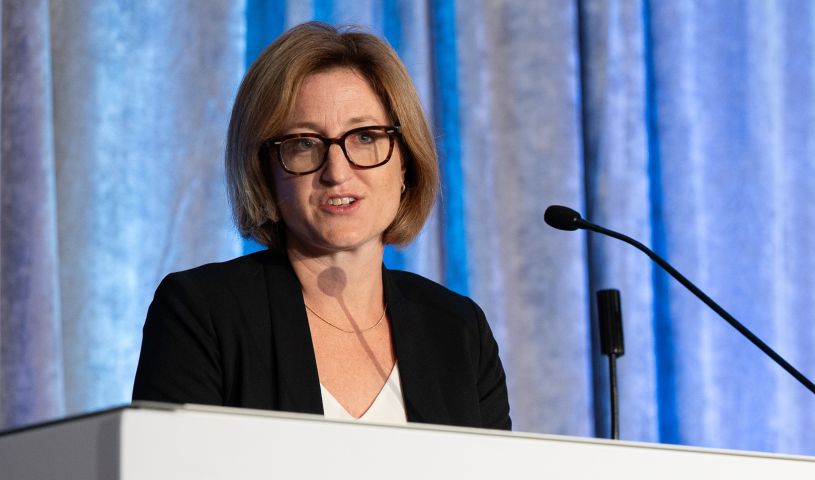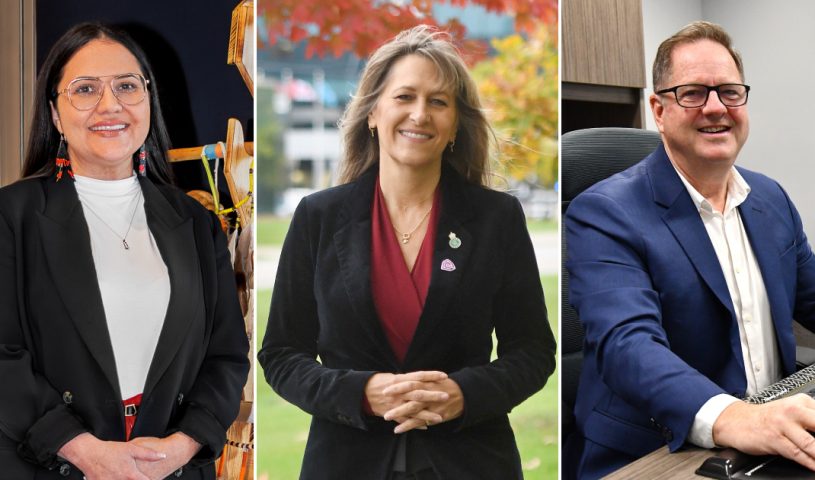New AMO boss navigates Ontario’s complex municipal agenda
 AMO executive director Lindsay Jones is navigating complex municipal challenges while shaping a forward-looking agenda for Ontario’s 444 municipalities. Photo: Association of Municipalities of Ontario
AMO executive director Lindsay Jones is navigating complex municipal challenges while shaping a forward-looking agenda for Ontario’s 444 municipalities. Photo: Association of Municipalities of Ontario
Lindsay Jones is just under two months into her role as executive director of the Association of Municipalities of Ontario (AMO). In her first six weeks, Jones has immersed herself in a complex landscape of municipal priorities, provincial politics, and public policy.
After three years as AMO’s director of policy, Jones stepped into the top job with a strong grasp of advocacy – but quickly discovered the broader responsibilities it entails.
In addition, Jones also serves as president of two affiliated corporations: Local Authority Services (LAS), which helps municipalities save costs through shared services; and the Municipal Employer Pension Centre of Ontario (MEPCO), which represents municipal employers in the OMERS pension plan. With more than 600,000 members, OMERS is currently undergoing a governance review – adding another layer of complexity to Jones’s new role.
“It’s been fantastic. It has certainly been a learning curve,” Jones said. “What’s really been exciting about the first six weeks is the chance to learn more about all of the other roles and services AMO provides beyond just policy and advocacy.”
Speed Camera Controversy
One of the first serious issues Jones faced as president was the provincial government’s stance on municipal speed cameras. Premier Doug Ford recently signalled his opposition to their use, prompting swift response from AMO.
Jones said, “right out of the gate,” AMO sent a letter to the province, clarifying the municipal position that speed cameras play a key role in road safety. Jones said municipalities rely on the cameras to change driver behaviour and protect vulnerable groups. These groups include school children and seniors.
With that in mind, Jones emphasized that AMO is open to working with the province to improve the program. She suggests some of the premier’s concerns could be addressed through clearer guidelines. She remains hopeful that dialogue can continue before any legislation is finalized.
As president, Jones now finds herself not only shaping policy but also publicly advocating for it – sometimes in contentious political environments. She acknowledged the challenging shift from behind-the-scenes policy work to public-facing leadership.
Jones said AMO’s role is “to provide sound public policy advice to the provincial government.” She noted that provincial leaders don’t always have access to the same information municipalities do, especially on local issues. This is particularly true when it comes to issues that fall within areas of municipal responsibility.
“We do really see that as a core part of our role, to be able to provide that new information or a look at maybe some of the unintended consequences of provincial decision making to the province,” Jones said. “We like to generally do that earlier on in the process, usually behind closed doors if we can. But if we need to do that in public, that’s not something that we’re afraid of. We still see that as a really important part of our role.”
Economic Focus and Community Issues
Looking ahead, Jones is focused on positioning municipalities as key players in Canada’s economic future. She believes municipalities are essential to advancing infrastructure, housing, energy, and industrial policy. Their role is especially critical as federal and provincial governments respond to global economic changes.
Helping other orders of government understand the role municipalities play in the economic agenda is “absolutely critical,” Jones said. Ontario municipalities, she added, collectively spend about $22 billion annually. That buying power can support broader economic goals.
Jones also emphasized the need to keep community-level issues front and centre. She said that while national debates often centre on macroeconomic policy, municipalities face urgent, everyday challenges. These include affordability, housing shortages, homelessness, and rising drug use in their communities.
“These challenges are top of mind for our members,” Jones said. “We need to find a way to ensure that they don’t get forgotten in some of these broader conversations about retooling the Canadian and Ontario economy.”
Balance for a Shifting Green Approach
Climate action remains another priority for AMO, though Jones acknowledged that political momentum has shifted. Both the federal and provincial governments have pivoted away from direct climate messaging. But Jones sees opportunities to align sustainability goals with existing policy directions.
Jones said there’s a strong emphasis on energy policy and expanding the grid. She added that AMO is investing in efforts to clarify Ontario’s path to net zero while helping municipalities embrace renewable energy projects.
Jones also noted that infrastructure spending presents another opportunity for green leadership.
“There are so many ways, when you are doing those big spends, to ensure that they’re done in a way that is the most energy efficient and with the most green approach possible,” Jones said. “There are ways to leverage the land use planning system, the building code, and other types of requirements that come at the issue less head on and more through a variety of different practical ways.”
New Approach to Provincial Co-operation
As she settles into her new role, Jones is focused on maintaining AMO’s reputation as a trusted voice for Ontario’s 444 municipalities. She sees her leadership as an opportunity to elevate local issues within provincial and federal policy frameworks – while staying grounded in the realities of community life.
Jones’s first six weeks have been a crash course in balancing advocacy, diplomacy, and strategic vision. Thanks to her policy background and dedication to evidence-based leadership, Jones is already shaping AMO’s direction. She’s ensuring municipalities are represented in every key decision-making space.
The overarching question for many AMO members is how they continue to do everything that is asked of them while struggling with declining resources.
AMO had previously pushed for what they were calling a social and economic prosperity review. This process would have seen municipal leaders sit down with the provincial government to figure out the best way to put both municipal and provincial finances on a sustainable path. That wasn’t something, Jones said, that the province has been “particularly interested in pursuing with us.”
Although it’s disappointing – especially considering how crucial fiscally sustainable municipalities are to nearly every public outcome – Jones said AMO is now taking a more piecemeal approach. Instead of broad reform, the organization is tackling financial challenges from multiple, smaller angles.
“Instead of having a nice big-picture conversation, we’re having to come at it from a variety of different angles,” Jones said. “Municipalities are in an impossible situation where inflation and additional responsibilities are being put on them while their revenue sources are eroding. So, we’re going to try and break it down into more bite-sized chunks.”
Addressing the Civility Crisis
Beyond policy, Jones is also confronting a growing concern across the municipal sector: the erosion of civility in public discourse and the increasing harassment faced by municipal staff.
Jones acknowledged that today’s political climate is challenging for both elected officials and municipal staff. While elected officials often face public scrutiny, staff are increasingly subjected to harassment or abuse simply for doing their jobs.
Jones pointed to the rise of social media as a driver of polarized and abusive behaviour, noting that AMO is working to support its members through this difficult climate.
“We’re trying to be realistic about what we can do in these situations,” she said. “We want to provide resources to help our members build resilience and adapt. But, at the same time, we know that this is not something that AMO alone can solve. It is about what tools are available to help each other, support each other, through the realities today of public service.”
Hope For the Future
Despite these challenges, Jones remains optimistic about the role municipalities play in shaping Ontario’s future. She believes local governments are essential to democracy and daily life – and that their relevance is only growing.
Despite the “litany of challenges” facing local governments, Jones said she has been struck during her three years at AMO by how vital municipalities are to residents and to democracy.
And as she reflects on her first six weeks as executive director, Jones admits the experience has been both exhilarating and demanding.
“It’s a wild ride, but we have an incredible team at AMO and a sector that’s united and focused on the right things,” she said. “That makes my job a heck of a lot of fun.” MW
✯ Municipal World Executive and Essentials Plus Members: You might also be interested in Mirko Petricevic ’s article: Municipal leaders build community by supporting local journalism.
Sean Meyer is digital content editor for Municipal World.
Related resource materials:
- UBCM president steps up with eyes on advocacy, equity, and urgency
- AMO members travel to Ottawa in critical year for municipalities
- AMCTO conference celebrates resiliency, advocacy, networking



